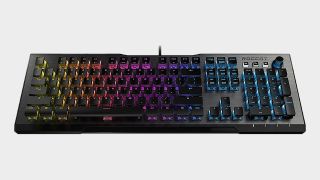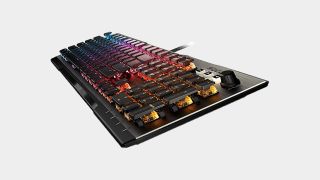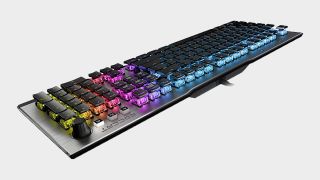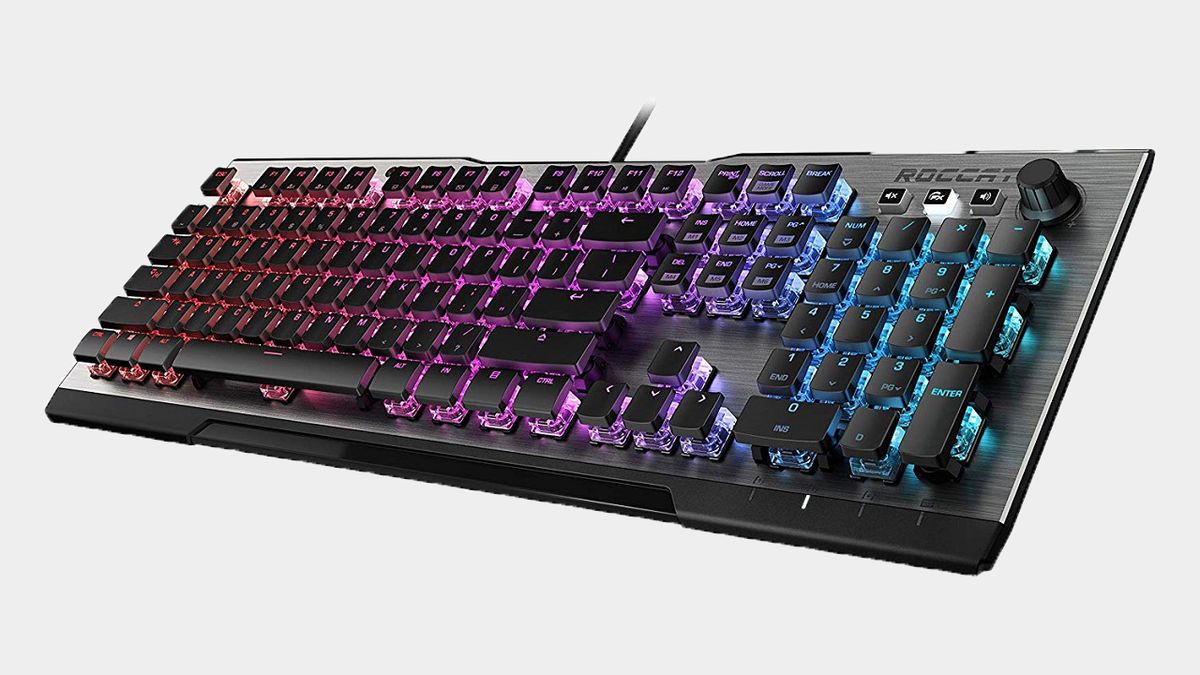12DOVE Verdict
A middling keyboard hampered by some missteps that doesn't excel in any one area enough to compensate
Pros
- +
Interesting low-profile design and exposed stems
- +
Attractive brushed anodized aluminum plate
- +
Dedicated media keys
Cons
- -
Wrist rest is a pointless afterthought
- -
Switches feel like an unexceptional hybrid
- -
No passthroughs or dedicated macro keys
Why you can trust 12DOVE
German manufacturer and eSports sponsor Roccat has largely made their name producing peripherals squarely targeted at gamers, emphasizing in-game performance and flashy aesthetics over workspace productivity. The Vulcan is a prime example of this design philosophy, a board that attempts to lure gamers with vivid RGB lighting and proprietary switches, but some unfortunate missteps leave it short of a bar that, in the realm of mechanical keyboards, is ever rising. And unfortunately, the Vulcan doesn't do any one thing so well that it stands out, or incorporate any appealing new tech that would push it free of the morass of mechanical decks that are constantly vying for PC gamers' precious dollars. For an overview of the cream of that particular crop, make sure you stop by our best gaming keyboard roundup.
Roccat Vulcan 120 AIMO - Design

Aesthetically, the Vulcan is an odd beast. I appreciate its low-profile form factor, and the brushed aluminum plate is a nice tonic for the unrelenting matte blacks we've become accustomed to in the chassis of other mechanical decks. The exposed stems are also a nice touch, a constant reminder of the technology powering the hardware, and they also allow the RGB underglow to shine boldly around and beneath the keycaps. The single braided, centered cable is also welcome, as someone who's long since lost patience with wrestling with massive, unwieldy cords jutting out from every peripheral on my desk. Unfortunately, that slender cable is only so manageable because the Vulcan doesn't support USB or audio passthrough.
There's also the question of the keycaps. The primary concave caps used on the majority of keys feel pleasant and ergonomic, curved to suit your fingers. On the other hand, the bottom row of keys are convex, which feels natural for the spacebar but quite odd when applied to the Ctrl, Alt, Windows, and Fn key. It feels almost like they're trying to repel your fingers, and it's easier than it should be to slip across and off of them. However, this could be a design feature so gamers can easily feel out where those ever-crucial CTRL and ALT keys are without looking down.
There are a number of other notable misses on the design side as well. A black plastic bezel runs around the edges of the plate, which is slim and unobtrusive around the sides and top but is an ugly, inch thick bar along the bottom. It lies just above the wrist rest, a flat rectangle of hard plastic that's so low that my wrists don't actually rest on it, not that the rigid plastic would provide much comfort or support if they did. Also, the media controls at the upper right of the board are an unattractive rubbery white that looks cheap and at odds with the design of the rest of the board, whether or not they're backlit. While the volume wheel is sturdy and functional, it's also the only component of the board lacking backlighting, so it looks out of place stuffed into the upper right corner. It's all a very strange mix.
Roccat Vulcan 120 AIMO - Features

Regardless of how they look, functionally the dedicated media keys and volume wheel are welcome, though the selection they chose for the dedicated keys is slightly baffling. Instead of standard play, pause, and rewind/ff offerings, the Vulcan has a mute button and a toggle to switch the wheel between volume and 'FX' controls. The standard media controls and six macro keys are bound to other keys and require you to hit the Fn button to access them.
The RGB lighting, on the other hand, is very robust, offering either zone or per-key backlighting. It's accessible through Roccat's slightly clumsy Swarm software, which also features some odd inclusions like the ability to set your headphones or speakers to emit the sound of a sci-fi blaster or an old typewriter every time you push a key. It's the sort of feature that's a fun novelty but that I can't imagine an actual human ever regularly using.
Beyond those extras, there aren't a ton of additional features tucked into the Vulcan package. No USB or audio passthrough, no dedicated macro keys, and no interchangeable keycaps. It's a fairly basic chassis, and at a $159.99 MSRP you'd expect to see a few more thoughtful extras.
Roccat Vulcan 120 AIMO - Performance

The Vulcan is built around Roccat's proprietary Titan switches, a quiet switch that falls somewhere between Cherry MX Reds and Browns in terms of performance. Since the Brown is itself already a hybrid switch, designed as a midpoint for people focused on the speed and performance of gaming switches and the feedback of typing switches, building a switch that then further feels like a hybrid offering seems like an unnecessary half step. The keys aren't fast or silent enough to truly please gamers looking to spam buttons, but they're not tactile or clicky enough to satisfy typists (though they decidedly lean towards the former). They also feel slightly muddy or gummy, though that may be due to my predilection for the heavy tactile feedback of Cherry MX Blues.
For an exposed switch, though, the Titans do feel quite stable. There's not a lot of wobble even in the spacebar, which looks practically like it's suspended by a gossamer thread above the back plate.
Overall - should you buy it?
Despite some of its foibles, both typing and gaming on the Vulcan is a pleasant experience. But it doesn't lean far enough in one direction for it to truly excel at either, and it's also not the most attractive mechanical keyboard. The main issue with the Vulcan is that, at its current price point, there are a number of other, higher quality, more fully featured keyboards available, like the Corsair K95 or Razer Huntsman. If you are considering it, I strongly recommend trying to get some hands-on time with it ahead of your purchase, to see if the weird hybrid formula Roccat landed on for their switches appeals to you. For me, it's difficult to recommend at $150.
Alan Bradley was once a Hardware Writer for GamesRadar and PC Gamer, specialising in PC hardware. But, Alan is now a freelance journalist. He has bylines at Rolling Stone, Gamasutra, Variety, and more.

Final Fantasy 7 Remake's Aerith actor is throwing her hat into the ring for the Legend of Zelda movie: "I just wanna audition for Zelda so bad"

Assassin's Creed Shadows boss is confident Ubisoft has a place in modern RPGs, even as the industry's goalposts shift: "When we were working on Odyssey, it was Breath of the Wild"

Dread it, run from it, the Palworld dating sim is real – and Pocketpair is tripling down with a Steam page starring "Chillet's little sister" and "Yandere Splatterina"











